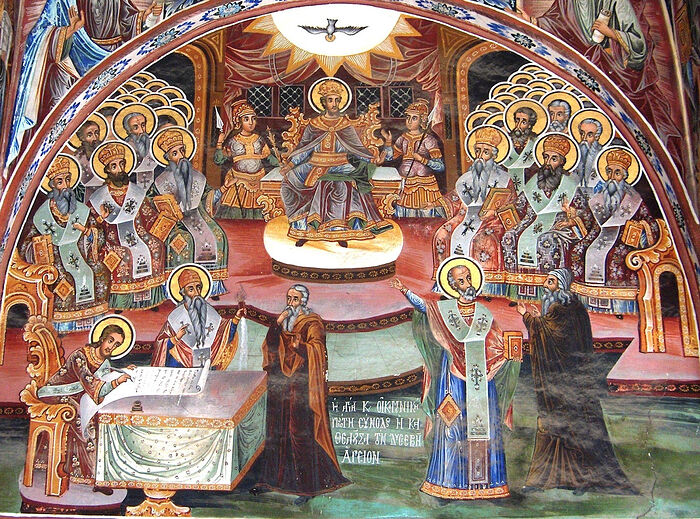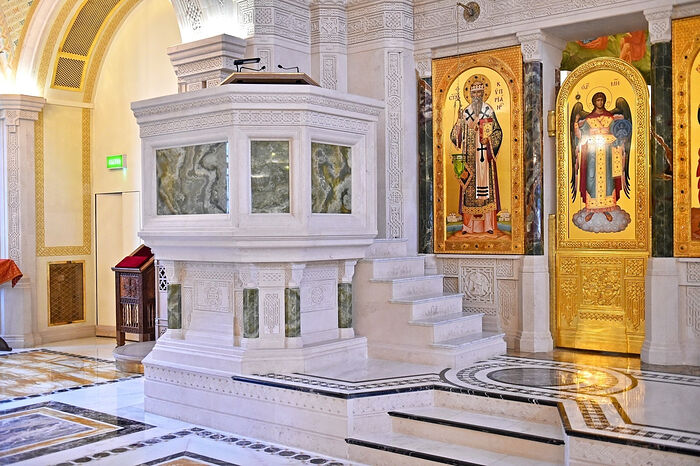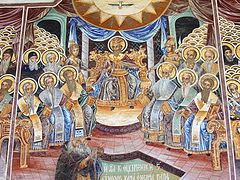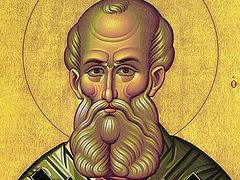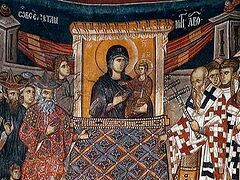In the name of the Father, the Son, and the Holy Spirit!
The first one to address the flock of Christ with words of instruction from the ambo—the raised pulpit in the church for readers—was St. John Chrysostom. Before him, that is, until the end of the fourth century, archpastors and pastors preached from the High Place in the altar, which was built like the steps of an amphitheater and was very tall, so that a man sitting on it could be seen by the worshippers in the church; moreover, the divider before the altar was low-built. It was very laborious for sick or aged clergyman to climb onto the High Place after the singing of the Trisagion, and even now in the rite of Divine Liturgy there is still the blessing of the High Place—the High Throne—the prayer to the Lord asking for strength and aid in ascending it.
Today from this ambo—a rare element in the interior of modern Orthodox churches in Russia but one that is sanctified by ancient tradition—we remember with gratitude and warmth those who ascended many times to the ambo and High Place to preach, and to defend and uphold the truths of Christ’s faith. We remember the fathers of the Six Ecumenical Councils.
A pleiade of approximately 1500 men—archpastors and pastors who were upstanding, sober, chaste, pious, honest, hospitable, instructive—over the course of three centuries formulated and clothed in verbal expressions what every person who calls himself a Christian should know. It created ecclesiastical teaching, determined the dogmas of the faith, “surpassing the mind in divinely revealed truths, having untraceable depths.”
We ask: For what did so many people labor, why did they tend to these complex and abstract matters, unrelated to everyday needs? After all, there is Holy Scripture, in which we find the words of Christ the Savior, and by which we guide our lives, awaiting salvation and the inheritance of eternal blessings. Was it only to show off their intellect and eloquence? For the sake of ambition and pride?
No! Not for glory and not out of idleness labored the fathers of the Ecumenical Councils, whom we remember today. “Only the evil of the heretics forces us to discuss that about which it would better to be silent,” said one of them—St. Hilary of Poitiers.
Mark them which cause divisions and offences contrary to the doctrine which ye have learned; and avoid them. For they that are such serve not our Lord Jesus Christ, but their own belly; and by good words and fair speeches deceive the hearts of the simple (Rom. 16: 17–18). With these words the apostle Paul warned the Roman Christians of the first century. But how often we fall for temptation, including the temptation of a smooth-sounding false teaching and lies.
You can’t gather grapes from thorns, or figs from thistles (cf. Matt. 7:16), and you can’t grow anything good from an impure heart. And if we take a look at the complicated and contradictory period of the life of our Church that is called the era of the Ecumenical Councils, then we are convinced that heresy is most often the fruit of a prideful heart and an arrogant mind.
A strict ascetic and famous spiritual father, who had 200 spiritual daughters alone, the Alexandrian priest Arius made it his task to unite Christianity with paganism. Spouting the mad belief that the second hypostasis of the Holy Trinity—Christ the Savior—was created by God the Father, he was hardly trying to seduce the as yet unbaptized minds of Christians who had only recently been pagans. To the contrary, his desire was essentially good—to make it easier for pagans to understand the faith of Christ. Just as Geb and Nut give birth to Osiris, and as Apollos came from Zeus and Leto, so, according to Arius, God the Father created God the Son. This terrible distortion of the teaching of the Holy Trinity and of the pre-eternal existence of each of the three Persons was, in the opinion of the presbyter-heresiarch, supposed to become the most effective missionary method, but in fact it became the self-willed trampling of Pre-eternal Truth, and blasphemy. Many, very many inhabitants of Alexandria and Egypt were enchanted by the preaching of Arius, that excellently talented poet, who laid out his heresy in the form of a poem called “Talia” and various rhapsodies. The simple folk were in ecstasies; the pleasant refrains and melodious songs were written specially for sailors, millers, and travelers, and became very popular and favorite. But let us remember that the expression “Vox populi vox Dei” is erroneous, “for the fickleness of the crowd always borders on madness.”
Nestorius, archbishop of the capital city of the great Empire, Constantinople, native to the distant Syrian city of Caesarea Germanicea on the Euphrates, a man of common birth, short of stature, with large, expressive eyes and a reddish-blonde head of hair, was possessed by enormous ambition and pride. Could any of us disciples of Christ say to our government leader what Nestorius said to the Emperor: “Give me a land cleansed of heresy, and I will give you heaven; help me overcome the heretics, and I will help you in your struggle against earthly enemies”? We hope in God’s mercy for us and do not dare to even think that it is in our power to give someone heaven. If Arius saw himself as a great preacher and missionary, then Nestorius took upon himself the role of the most zealous warrior against evil teaching and heresies. In the end he himself became the founder of a heresy, rejecting the divine essence of the Lord Jesus Christ.
The desire for absolute power and domination over our neighbors, namely, to be the first among all Eastern bishops, compelled the Archbishop of Alexandria Dioscorus to support the heresy of Archimandrite Eutichios, who rejected the Lord Jesus Christ’s human nature. Bearing the title of the Thirteenth Apostle and Judge of the inhabited world, he came to the city of Ephesus to deal with the false teaching of the Monophysites, but instead judged at the false counsel the righteous Holy Hierarch Flavian of Constantinople. When he saw that he was losing the struggle for power, he broke communion not only with the Ecumenical Church as an institution, but also with the True Faith, and took almost all of Egypt and Syria with him.
Fainthearted and fearful of contradicting the emperor, Patriarchs Sergius of Constantinople, Kyr of Alexandria, and Pope Honorius justified their own cowardice and like passions with the lofty intention of serving their fatherland and people torn apart by Monophytism and Nestorianism, and began to falsely teach a single will of the Savior. But their heretical conspiracy brought no benefit, and their memory perished with a resounding noise.
We believe, dear brothers and sisters, that there is only one Holy Catholic and Apostolic Church, and its body does not cease to live though it be cut asunder. Heretics and schismatics are like infected members that have fallen away from this Body and are in a state of spiritual death, but this doesn’t do damage to the unity and integrity of the Holy Church.
If we look around we will see what is now happening with these ancient heresies. Once a third of Alexandria and Egypt sang Arius’s “Talia”, and the barbarian tribes of the Goths, Vandals, and Burgundians were Arians. The Nestorian church of the East stretched from Mesopotamia to China. The Monophysite churches of Syria, Egypt, Armenia, and Ethiopia have long lost both the interest in and ability to conduct theological polemics to defend the doctrines of Eutyches and Dioscoros, and have become no more than insular national churches for Christian peoples surrounded by an aggressive Moslem world.
We know it will always be that evil men and seducers shall wax worse and worse, deceiving, and being deceived (1 Tim. 3:13), and as long as sin lives in people, new heresies will arise. But they shall proceed no further: for their folly shall be manifest unto all men, as their's also was (2 Tim. 3:9), as the apostle Paul comforts us. St. Gregory the Theologian seconds him: “It is no calamity if the heretics have warmed themselves and get up the courage to crawl out of their holes in the spring… I know very well, that they will not hiss for long, and then they will hide, laid low by both truth and time; and the more quickly this happens, the greater will be the hope with which leave it all up to God.”
So shall we, dear brothers and sisters, leave everything up to God; and He Himself will with truth and time destroy all the madness of those who doubt in the faith of Christ. We ourselves will refrain from pouring, even under noble pretexts, sinful oil on the fire of our wrath, irritation, judgment, and slander, which at first burns against erring heretics, but then also scorches our neighbors, and finally becomes the endless fire of Gehenna for our own selves. Instead of unnecessary arguments with heretics (and we should remember: A man that is an heretick after the first and second admonition reject [Tit. 3:10]), let us make the effort to study our faith and the history of the Church, so that the names of Sts. Athanasius the Great, Cyril of Alexandria, Gregory the Theologian, Maximus the Confessor, Minas of Constantinople, and other fathers of the Six Ecumenical Councils might become close and dear to us.
Today, on the commemoration day of these true archpastors and pastors, to restrain ourselves from extremes and for spiritual edification, let us not forget the simple and wise words of St. Silhouan of Mt. Athos: “The Holy Spirit, it is said, has placed bishops in the Church to shepherd the Lord’s flock; and if people understood this, then they would love the shepherds with great love and rejoice in soul at the sight of their shepherd. Whoever bears within himself the grace of the Holy Spirit know what I am talking about. For their humility and love for the people, the Lord loves them. They are always in great labors and ascetic feats, and for this they are enriched with the mind of the saints, whom they emulate by their lives. Brothers, let us abide in obedience to our pastors, and then there will be common peace; and the Lord will abide in the Holy Spirit with all of us.”
Amen.

